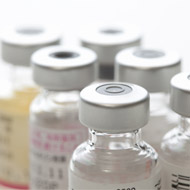VMD provides update on veterinary medicines containing Diethanolamine

Stocks of authorised flunixin injections for non-food horses only are now available on the UK market.
The Veterinary Medicines Directorate (VMD) has provided an update on medicines containing Diethanolamine (DEA), which were suspended in 2018 over concerns of a risk to humans from consuming food from animals treated with the products.
In a previous announcement, the VMD permitted supply of flunixin products (which contain DEA) for use in non-food producing horses, provided the supply was accompanied by a ‘Caution in Use’ letter for the veterinary surgeon. This was to address the potential lack of availability of flunixin for intravenous use in non-food horses
In its latest update, the VMD writes that stocks of authorised flunixin injections for non-food horses only are now available on the UK market and authorised product for food producing species (reformulated to remove diethanolamine) will shortly be available.
As such, the supply of any existing stock accompanied by a ‘Caution in Use’ letter, must now cease immediately.



 The latest
The latest